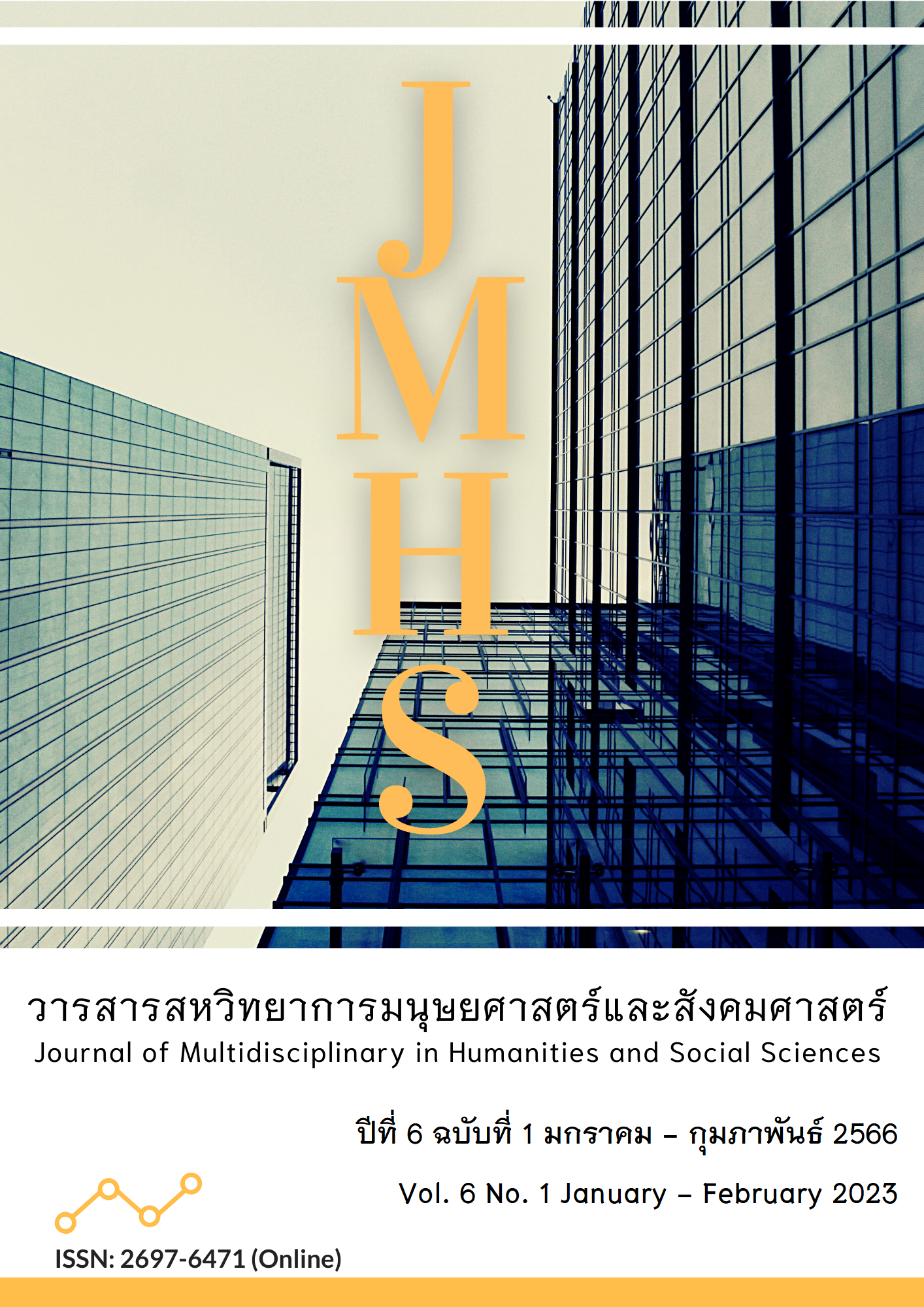รูปแบบการจัดการเรียนรู้อาชีพและทักษะอนาคตสำหรับวิทยาลัยอาชีวะและเทคนิคยุคชีวิตวิถีใหม่
Main Article Content
บทคัดย่อ
บทความวิจัยครั้งนี้มีวัตถุประสงค์ 1) เพื่อพัฒนารูปแบบการจัดการเรียนรู้อาชีพและทักษะอนาคตสำหรับวิทยาลัยอาชีวะและเทคนิคยุคชีวิตวิถีใหม่ 2) เพื่อประเมินผลการจัดการเรียนรู้อาชีพและทักษะอนาคตสำหรับวิทยาลัยอาชีวะและเทคนิคยุคชีวิตวิถีใหม่ 2.1 ความสามารถในการจัดการเรียนรู้ด้วยกระบวนการ Active Learning ของครูผู้สอน ได้แก่ (2.1.1) ความสามารถในการออกแบบการจัดการเรียนรู้ด้วยกระบวนการ Active Learning ของครูผู้สอน และ (2.1.2) ความสามารถในการจัดการเรียนรู้ด้วยกระบวนการ Active Learning ของครูผู้สอน 2.2 เพื่อประเมินความสามารถในการสร้างสรรค์นวัตกรรมของนักศึกษา 2.3 แบบวัดความคิดเห็นของสมาชิกชุมชนที่มีต่อรูปแบบการจัดการเรียนรู้อาชีพและทักษะอนาคตสำหรับวิทยาลัยอาชีวะและเทคนิคยุคชีวิตวิถีใหม่ ซึ่งดำเนินการตามขั้นตอนการวิจัยและพัฒนา (R&D) กลุ่มตัวอย่างที่ใช้ในการวิจัยคือ นักศึกษาอาชีวศึกษา จำนวน 35 คน ครูผู้สอน 4 คน ครูพี่เลี้ยง 4 คน อาจารย์นิเทศก์ 1 คน และผู้เชี่ยวชาญจำนวน 1 คน วิเคราะห์ข้อมูลโดยค่าเฉลี่ยเลขคณิต ส่วนเบี่ยงเบนมาตรฐาน และการวิเคราะห์เนื้อหา
ผลการวิจัยพบว่า ผลการพัฒนารูปแบบการจัดการเรียนรู้อาชีพและทักษะอนาคตสำหรับวิทยาลัยอาชีวะและเทคนิคยุคชีวิตวิถีใหม่ที่พัฒนาขึ้น มีองค์ประกอบ 5 ด้านคือ 1) หลักการของรูปแบบ 2) วัตถุประสงค์ของรูปแบบ 3) กระบวนการ 4) การวัดและประเมินผล และ 5) เงื่อนไขการนำรูปแบบไปใช้ ผลการศึกษาประสิทธิภาพของรูปแบบ พบว่า 1) ความสามารถในการออกแบบการจัดการเรียนรู้ด้วย Active Learning ของครูผู้สอนอยู่ในระดับมาก 2) ความสามารถในการจัดการเรียนรู้ด้วย Active Learning ของครูผู้สอนอยู่ในระดับมากที่สุด 3) ความคิดเห็นของสมาชิกที่ได้รับการแลกเปลี่ยนเรียนรู้ในชุมชนวิชาชีพภาพรวมอยู่ในระดับมากที่สุด และ 4) ความสามารถในการสร้างสรรค์นวัตกรรมของนักศึกษาอยู่ในระดับมากที่สุด
Article Details

อนุญาตภายใต้เงื่อนไข Creative Commons Attribution-NonCommercial-NoDerivatives 4.0 International License.
ทัศนะและความคิดเห็นที่ปรากฏในวารสาร ถือเป็นความรับผิดชอบของผู้เขียนบทความนั้น และไม่ถือเป็นทัศนะและความรับผิดชอบของกองบรรณาธิการ
เอกสารอ้างอิง
กมล โพธิเย็น. (2564). Active Learning: การจัดการเรียนรู้ที่ตอบโจทย์การจัดการศึกษาในศตวรรษที่ 21. วารสารศึกษาศาสตร์ มหาวิทยาลัยศิลปากร, 19(1), 11-28.
กานต์ อัมพานนท์. (2561). การพัฒนารูปแบบการเรียนรู้เชิวรุกที่ส่งเสริมทักษะการคิดวิชาความเป็นครู สำหรับนักศึกษาคณะครุศาสตร์ มหาวิทยาลัยราชภัฎเพชรบูรณ์. ราชภัฎเพชรบูรณ์สาร, 20(2), 87-101.
กุลกาญจน์ สุวรรณรักษ์. (2564). การพัฒนารูปแบบชุมชนการเรียนรู้ทางวิชาชีพออนไลน์เพื่อส่งเสริมการจัดการเรียนรู้ด้วยกระบวนการคิดเชิงออกแบบ สำหรับนักศึกษาวิชาชีพครูที่ส่งเสริมความสามารถการสร้างสรรค์นวัตกรรมของนักเรียนประถมศึกษา. วารสารศิลปากรศึกษาศาสตร์วิจัย, 13(2), 184-201.
จุราภรณ์ ปฐมวงษ์. (2565). การพัฒนารูปแบบการเรียนรู้เชิงรุก (Active Learning) เพื่อส่งเสริมทักษะการพูดสนทนาภาษาอังกฤษ สำหรับนักเรียนชั้นมัธยมศึกษาปีที่ 3. Journal of Modern Learning Development, 7(4), 143-159.
ดิเรก พรสีมา. (2559). ครูไทย 4.0. กรุงเทพฯ: สำนักปลัดกระทรวงศึกษาธิการ.
ทิพย์วิมล วังแก้วหิรัญ. (2564). กระบวนการพัฒนาวิชาชีพครูแบบชุมชนแห่งการเรียนรู้วิชาชีพในประเทศไทย และต่างประเทศ. วารสารเศรษฐศาสตร์และกลยุทธฺการจัดการ, 8(1),180-199.
บุญส่ง หาญพานิช. (2558). การจัดการเรียนรู้เชิงรุกจากทฤษฎีสู่การปฏิบัติ. กรุงเทพฯ: จิรวัฒน์เอ๊กเพรส.
พรทิพย์ วงศ์ไพบูลย์. (2560). การเรียนรู้เชิงรุกและการมีส่วนร่วมของผู้เรียน (Active Learning). วารสารสถาบันวิจัยญาณสังวร, 8(2), 327-336.
มนตรี แย้มกสิกร. (2559). ชุมชนการเรียนรู้เชิงวิชาชีพ: ความท้าทายต่อการเปลี่ยนแปลงตนเองของครู. กรุงเทพฯ: สำนักงานเลขาธิการคุรุสภา.
รัตนะ บัวสนธ์. (2552). การวิจัยและพัฒนานวัตกรรมการศึกษา. กรุงเทพฯ: คำสมัย.
วิจารณ์ พานิช. (2555). วิถีสร้างการเรียนรู้ครูเพื่อศิษย์ในศตวรรษที่ 21. กรุงเทพฯ: ตถตาพลับลิเคชั่น.
วิชัย วงษ์ใหญ่ และ มารุต พัฒผล. (2562). การพัฒนาทักษะสร้างสรรค์นวัตกรรม. กรุงเทพฯ: ศูนย์ผู้นำนวัตกรรมหลักสูตรและการเรียนรู้.
สำนักงานคณะกรรมการการศึกษาขั้นพื้นฐาน, กระทรวงศึกษาธิการ. (2562). แนวทางการนิเทศเพื่อพัฒนาและส่งเสริมการจัดการเรียนรู้เชิงรุก (Active Learning) ตามนโยบายลดเวลาเรียน เพิ่มเวลารู้. กรุงเทพฯ: สำนักงานคณะกรรมการการศึกษาขั้นพื้นฐาน.
สำนักงานคณะกรรมการอาชีวศึกษา. (2560). แนวทางการขับเคลื่อนกระบวนการชุมชนการเรียนรู้ทางวิชาชีพ. กรุงเทพฯ: สำนักงานคณะกรรมการอาชีวศึกษา.
Damnoen, P.S., Siri, P., Supattho, P.S., & Kaewwilai, K. (2021). The Development of Student Characteristics in According to the Nawaluk Framework of the Buddhist integration of Buddhapanya Sri Thawarawadee Buddhist College. Asia Pacific Journal of Religions and Cultures, 5(2), 126–135. Retrieved from https://so06.tci-thaijo.org/index.php/ajrc/article/ view/249662
DuFour, R., DuFour, R., & Eaker, R. (2008). Revisiting Professional Learning Communities at Work. Bloomington: Solution Tree Press.
Phumphongkhochasorn, P., Damnoen, S., Tuwanno, P.D.M., Srichan, P. W., & Udomdhammajaree, P. (2022). Educational Quality Assurance and School Management Standards According to International. Asia Pacific Journal of Religions and Cultures, 6(1), 1–16. Retrieved from https://so06.tci-thaijo.org/index.php/ajrc/article/view/244349
Senge, P. (2006). The Fifth Discipline Field Book: Strategies and Tools for Building a Learning Organization. New York: Doubleday.


